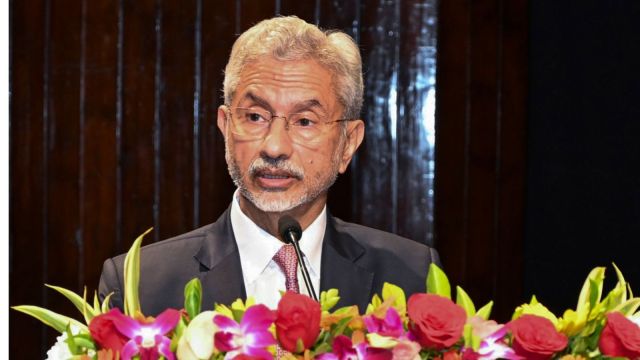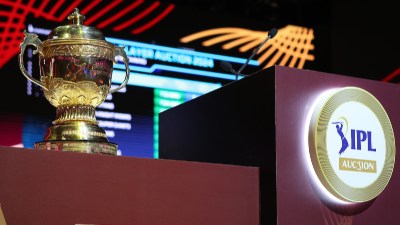Jaishankar flags challenge from China, ‘weaponisation’ of market instruments
Hitting out at Pakistan for its “support to cross-border terrorism”, External Affairs Minister S Jaishankar said “that cancer is now consuming its own body politic”.
 Jaishankar delivers the Nani Palkhivala Lecture in Mumbai In January. (PTI Photo)
Jaishankar delivers the Nani Palkhivala Lecture in Mumbai In January. (PTI Photo)Barely days ahead of Donald Trump taking over as US President amid growing concerns over imposition of tariffs or crackdown in immigration, External Affairs Minister S Jaishankar outlined the global challenges due to “the weaponisation of market instruments and financial institutions”. At the same time, he underlined the link between economic growth and strategic “autonomy.”
He also framed the China challenge saying the India-China relationship is trying to disentangle itself from the complications arising from the post-2020 border situation. Even as that is being addressed, more thought needs to be given to the longer-term evolution of ties, Jaishankar said.
Delivering the 19th Nani A Palkhivala Memorial Lecture in Mumbai, Jaishankar said: “The relevance of this ‘New India’ to global politics arises not just from its growing abilities, but also the circumstances of its rise. Particularly in light of Covid experiences, there is today in the world a much sharp awareness of the risks to the international economy of over-concentration, be it in manufacturing or in emerging technologies. The growing weaponisation of economic capabilities, including market shares, has become a major source of anxiety. The digital era has also brought forth its own set of challenges, focused on trust and transparency. Individuals and societies can no longer be agnostic about where their data resides and how and by whom it is harnessed.”
Jaishankar will attend the inauguration of the US President and will also meet his counterpart, US Secretary of State nominee Marco Rubio on the sidelines, along with Quad foreign ministers.
“The challenge for India is to undertake its rise in such unpredictable circumstances. To do that, it has to accelerate both its internal growth and modernization, as well as de-risk its external exposure. At home, that is best done through political stability, broad-based growth and inclusive growth and continuing reforms. It means more focus on manufacturing as well as food and health security, while building the deep strengths that would make us competitive. Strategic autonomy, after all, is acquiring greater economic connotations,” he said.
Framing the challenge from China, Jaishankar said: “At a time when most of its relationships are moving forward, India confronts a particular challenge in establishing an equilibrium with China. Much of that arises from the fact that both nations are on the rise. As immediate neighbours and the only two societies with over a billion people, their dynamic could never have been easy. But it has been further sharpened by a boundary dispute, by some baggage of history and by differing socio-political systems. Mis-readings by past policy-makers, whether driven by idealism or absence of realpolitik, has actually helped neither cooperation nor competition with China. That has clearly changed in the last decade.”
“Right now, the relationship is trying to disentangle itself from the complications arising from the post-2020 border situation. Even as that is being addressed, more thought needs to be given to the longer-term evolution of ties. Clearly, India has to prepare for expressions of China’s growing capabilities, particularly those that impinge directly on our interests. To hold up its own end, a more rapid development of India’s comprehensive national power is necessary. This is not just about correcting the earlier neglect of the border infrastructure and oceanic periphery, but also in mitigating dependence in sensitive domains. There could naturally be practical cooperation, undertaken with due diligence. All in all, India’s approach can be summed up in terms of the three mutuals, i.e., mutual respect, mutual sensitivity and mutual interests…What is at stake is actually the larger prospects of both nations and, in fact, even of the global order. It needs an acceptance that the emergence of a multi-polar Asia is an essential pre-requisite for a multi-polar world,” he said.
Underlining that some key relationships – such as with the US, China, Pakistan or Israel – have actually been approached with far greater realism, he said, “This is a result of shifts in our country, in our society – in its politics, economics and security thinking. Particularly with respect to the US, India was able to overcome what Prime Minister Modi has described as ‘hesitations of history’…Once India abandoned this earlier mindset, the benefits of deeper cooperation have become apparent – they are there for all of you to see. It is unfolding in domains like security, cyber, space and emerging technologies to digital, science, education, trade and business.”
Acknowledging that changes in US “policy and posture” will have implications for India., Jaishankar said that “because the complementarity is already strong and visible, indicators point to a robust growth in our cooperation in the days ahead.”
Hitting out at Pakistan for its “support to cross-border terrorism”, he said “that cancer is now consuming its own body politic”.
“Pakistan is an exception in our neighbourhood in view of its support to cross-border terrorism. That cancer is now consuming its own body politic. The entire subcontinent has a shared interest in Pakistan abjuring that approach,” Jaishankar said.
On India-Russia ties, Jaishankar said that despite the ups and downs, Russia has been salient to India’s policy since 1945. “This is actually one relationship that has largely held steady,” he said. “Currently, as Russia is redirecting its attention towards Asia, there is a further logic that is emerging. Deeper economic cooperation between India and Russia has a stabilising consequence for the global economy through potential collaborations. India’s expanding footprint will meet Russia’s influence in many regions,” he said.







